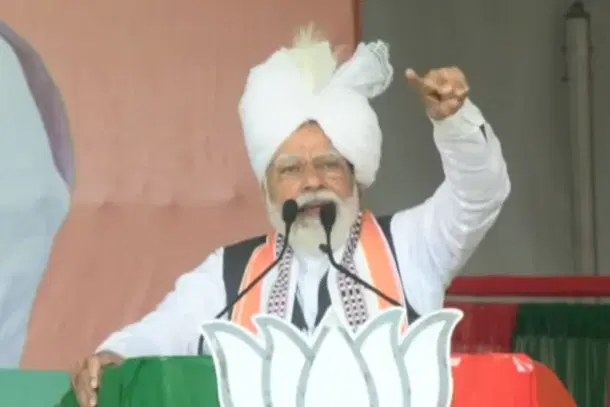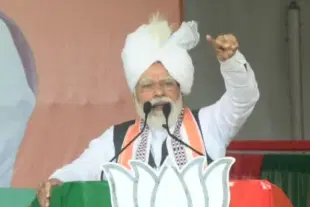News Brief
'Atta, Chawal Not Enough': Modi Tells Farmers As Nutrition Security Takes Centre Stage In New Schemes
Swarajya News Staff
Oct 12, 2025, 06:54 AM | Updated 06:54 AM IST
Save & read from anywhere!
Bookmark stories for easy access on any device or the Swarajya app.


Prime Minister Narendra Modi launched two major agricultural schemes on Saturday with a combined outlay of ₹35,440 crore, urging farmers to diversify beyond traditional wheat and rice crops to ensure nutrition security for India's growing population.
Speaking at the Indian Agricultural Research Institute in New Delhi, Modi stressed that whilst wheat and rice remain essential for food security, the nation must prioritise nutritional value alongside production volumes. The government approved the Mission for Aatmanirbharta in Pulses with an outlay of ₹11,440 crore and the Pradhan Mantri Dhan Dhaanya Krishi Yojana worth ₹24,000 crore, both spanning six years from 2025-26 to 2030-31.
The Prime Minister emphasised the critical role pulses play in providing protein to India's vegetarian population, calling for self-sufficiency in a sector where imports have surged dramatically. India's pulses imports touched a record 6. 9 million tonnes in 2024-25, highlighting a persistent gap between domestic production and consumption.
The Mission for Aatmanirbharta in Pulses aims to increase domestic production from the current 25. 24 million tonnes to 35 million tonnes by 2030-31, whilst expanding cultivation area to 310 lakh hectares. Nearly 20 million farmers are expected to benefit from guaranteed procurement, quality seed distribution and enhanced value chain support under the initiative.
The Pradhan Mantri Dhan Dhaanya Krishi Yojana, inspired by NITI Aayog's Aspirational Districts Programme, will focus on 100 low-performing agricultural districts across the country.
The scheme aims to enhance agricultural productivity, promote crop diversification, improve irrigation and storage facilities, and ensure credit access by converging 36 existing schemes across 11 departments. Though the programme carries no separate budget allocation, it will bring underperforming districts up to par with national averages through targeted interventions monitored via 117 key performance indicators on a monthly dashboard.
Modi highlighted India's agricultural achievements over the past decade, noting that farm exports have nearly doubled, foodgrain production has increased by 90 million tonnes, and fruits and vegetables production has risen by 64 million tonnes since 2014. He reminded the audience that recent GST rate reductions have particularly benefited rural India and farmers, with prices of agricultural machinery such as tractors declining.
The Prime Minister also pointed to India's position as the world's largest producer of milk, contributing 25 per cent of global milk supply, and as the leading producer of millets, whilst ranking second globally in rice and wheat production.
During the programme, Modi distributed certificates to 50,000 farmers certified under the National Mission for Natural Farming and 50 lakh memberships in 10,000 Farmer Producer Organisations. He also inaugurated and laid foundation stones for 1,100 projects worth over ₹6,300 crore under the Agriculture Infrastructure Fund, animal husbandry, fisheries and food processing sectors.





